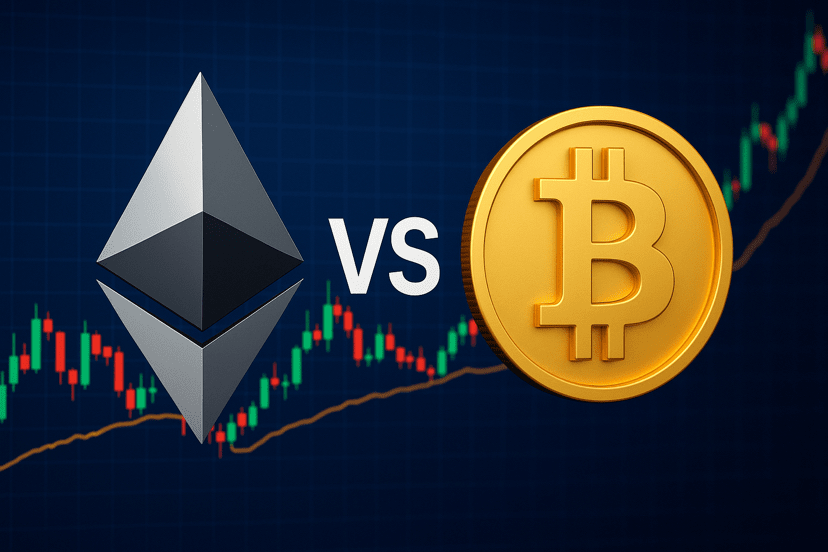In recent months, #Ethereum has shown solid recovery, consolidating its position as the second most valuable asset in the crypto ecosystem. While Bitcoin maintains its historical dominance, the gap between the two has narrowed, rekindling an old discussion: can Ethereum catch up to or even surpass Bitcoin in price and market capitalization?
Distinct fundamentals, distinct trajectories
#bitcoin was born as a store of value and a decentralized alternative to fiat money. Its narrative has revolved around scarcity (21 million coins), its security as a network, and its role as 'digital gold'. On the other hand, Ethereum was designed as a smart contract platform, allowing the creation of decentralized applications (dApps) and tokens, such as the popular ERC-20 and ERC-721.
These structural differences mean that both assets do not directly compete for the same use, but do compete for market interest. In terms of capitalization, Bitcoin remains in the lead with over 45% of the global crypto market dominance, while Ethereum fluctuates between 15% and 20%.
What would I need $ETH to catch up with $BTC ?
Increase in institutional and corporate adoption
If Ethereum consolidates its presence as the default infrastructure for enterprise and government solutions in blockchain, its valuation could experience a structural leap.Effective scalability and cost reduction
Solutions like Ethereum 2.0, rollups, and L2 chains (like Arbitrum and Optimism) are starting to bear fruit. A faster and cheaper network could facilitate mass adoption.Narrative of 'productive asset'
Unlike Bitcoin, ETH holders can participate in staking and earn yields, which has been interpreted by some investors as an additional intrinsic value.Positive regulatory performance
If Ethereum is classified as a commodity (as some industry players expect), rather than a security, it could attract more institutional capital that currently remains on the sidelines due to legal uncertainty.
Obstacles preventing the 'flippening'
The 'flippening' — a term that describes the possible moment when Ethereum surpasses Bitcoin in market capitalization — is not an imminent scenario. Bitcoin enjoys a symbolic, historical, and brand advantage that remains powerful. Furthermore, its simplicity makes it an easier option for new institutional investors to understand. The perception of Ethereum as a 'machine for applications' has not yet resonated with the same depth.
Moreover, there are technical and governance challenges that Ethereum still needs to resolve, especially regarding the control that certain validators or development groups can exert over its technical direction.
What does the market say?
With Ethereum trading at levels above $3,700 USD (as of July 2025), some technical analysts point to a possible breakout towards $5,000 USD if the bullish momentum continues. However, to match Bitcoin in capitalization, ETH would need to multiply its price several times — something that, while not impossible, would require a very favorable confluence of macroeconomic, technological, and regulatory factors.
Conclusion
Ethereum and Bitcoin are, above all, complementary technologies rather than competitors. Although it is unlikely that Ethereum will match Bitcoin in the short term, the ecosystem continues to evolve, and with it, the value narratives that determine investor behavior. If the decentralized sector of the economy continues to grow, both assets could thrive in parallel, each fulfilling a distinct role within the new digital architecture of value.

From projects like #BitValue , we closely observe how these dynamics impact the practical use and monetization of data within the blockchain ecosystem.
